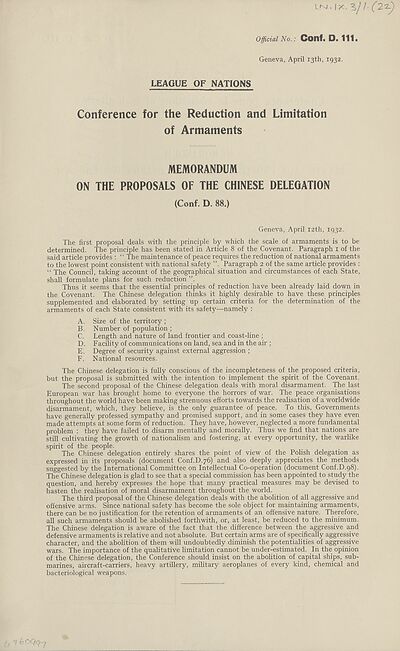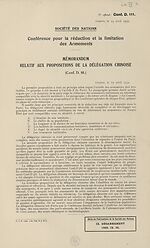Download files
Complete book:
Individual page:
Thumbnail gallery: Grid view | List view

lx, ^//' (2^)
Official No.: Coilf. D. 111.
Geneva, April 13th, 1932.
LEAGUE OF NATIONS
Conference for the Reduction and Limitation
of Armaments
MEMORANDUM
ON THE PROPOSALS OF THE CHINESE DELEGATION
(Conf. D. 88.)
Geneva, April 12th, 1932.
The first proposal deals with the principle by which the scale of armaments is to be
determined. The principle has been stated in Article 8 of the Covenant. Paragraph 1 of the
said article provides : “ The maintenance of peace requires the reduction of national armaments
to the lowest point consistent with national safety Paragraph 2 of the same article provides :
“ The Council, taking account of the geographical situation and circumstances of each State,
shall formulate plans for such reduction
Thus it seems that the essential principles of reduction have been already laid down in
the Covenant. The Chinese delegation thinks it highly desirable to have these principles
supplemented and elaborated by setting up certain criteria for the determination of the
armaments of each State consistent with its safety—namely :
A. Size of the territory ;
B. Number of population ;
C. Length and nature of land frontier and coast-line ;
D. Facility of communications on land, sea and in the air ;
E. Degree of security against external aggression ;
F. National resources.
The Chinese delegation is fully conscious of the incompleteness of the proposed criteria,
but the proposal is submitted with the intention to implement the spirit of the Covenant.
The second proposal of the Chinese delegation deals with moral disarmament. The last
European war has brought home to everyone the horrors of war. The peace organisations
throughout the world have been making strenuous efforts towards the realisation of a worldwide
disarmament, which, they believe, is the only guarantee of peace. To this, Governments
have generally professed sympathy and promised support, and in some cases they have even
made attempts at some form of reduction. They have, however, neglected a more fundamental
problem : they have failed to disarm mentally and morally. Thus we find that nations are
still cultivating the growth of nationalism and fostering, at every opportunity, the warlike
spirit of the people.
The Chinese delegation entirely shares the point of view of the Polish delegation as
expressed in its proposals (document Conf.D.76) and also deeply appreciates the methods
suggested by the International Committee on Intellectual Co-operation (document Conf.D.98).
The Chinese delegation is glad to see that a special commission has been appointed to study the
question, and hereby expresses the hope that many practical measures may be devised to
hasten the realisation of moral disarmament throughout the world.
The third proposal of the Chinese delegation deals with the abolition of all aggressive and
offensive arms. Since national safety has become the sole object for maintaining armaments,
there can be no justification for the retention of armaments of an offensive nature. Therefore,
all such armaments should be abolished forthwith, or, at least, be reduced to the minimum.
The Chinese delegation is aware of the fact that the difference between the aggressive and
defensive armaments is relative and not absolute. But certain arms are of specifically aggressive
character, and the abolition of them will undoubtedly diminish the potentialities of aggressive
wars. The importance of the qualitative limitation cannot be under-estimated. In the opinion
of the Chinese delegation, the Conference should insist on the abolition of capital ships, sub¬
marines, aircraft-carriers, heavy artillery, military aeroplanes of every kind, chemical and
bacteriological weapons.
Official No.: Coilf. D. 111.
Geneva, April 13th, 1932.
LEAGUE OF NATIONS
Conference for the Reduction and Limitation
of Armaments
MEMORANDUM
ON THE PROPOSALS OF THE CHINESE DELEGATION
(Conf. D. 88.)
Geneva, April 12th, 1932.
The first proposal deals with the principle by which the scale of armaments is to be
determined. The principle has been stated in Article 8 of the Covenant. Paragraph 1 of the
said article provides : “ The maintenance of peace requires the reduction of national armaments
to the lowest point consistent with national safety Paragraph 2 of the same article provides :
“ The Council, taking account of the geographical situation and circumstances of each State,
shall formulate plans for such reduction
Thus it seems that the essential principles of reduction have been already laid down in
the Covenant. The Chinese delegation thinks it highly desirable to have these principles
supplemented and elaborated by setting up certain criteria for the determination of the
armaments of each State consistent with its safety—namely :
A. Size of the territory ;
B. Number of population ;
C. Length and nature of land frontier and coast-line ;
D. Facility of communications on land, sea and in the air ;
E. Degree of security against external aggression ;
F. National resources.
The Chinese delegation is fully conscious of the incompleteness of the proposed criteria,
but the proposal is submitted with the intention to implement the spirit of the Covenant.
The second proposal of the Chinese delegation deals with moral disarmament. The last
European war has brought home to everyone the horrors of war. The peace organisations
throughout the world have been making strenuous efforts towards the realisation of a worldwide
disarmament, which, they believe, is the only guarantee of peace. To this, Governments
have generally professed sympathy and promised support, and in some cases they have even
made attempts at some form of reduction. They have, however, neglected a more fundamental
problem : they have failed to disarm mentally and morally. Thus we find that nations are
still cultivating the growth of nationalism and fostering, at every opportunity, the warlike
spirit of the people.
The Chinese delegation entirely shares the point of view of the Polish delegation as
expressed in its proposals (document Conf.D.76) and also deeply appreciates the methods
suggested by the International Committee on Intellectual Co-operation (document Conf.D.98).
The Chinese delegation is glad to see that a special commission has been appointed to study the
question, and hereby expresses the hope that many practical measures may be devised to
hasten the realisation of moral disarmament throughout the world.
The third proposal of the Chinese delegation deals with the abolition of all aggressive and
offensive arms. Since national safety has become the sole object for maintaining armaments,
there can be no justification for the retention of armaments of an offensive nature. Therefore,
all such armaments should be abolished forthwith, or, at least, be reduced to the minimum.
The Chinese delegation is aware of the fact that the difference between the aggressive and
defensive armaments is relative and not absolute. But certain arms are of specifically aggressive
character, and the abolition of them will undoubtedly diminish the potentialities of aggressive
wars. The importance of the qualitative limitation cannot be under-estimated. In the opinion
of the Chinese delegation, the Conference should insist on the abolition of capital ships, sub¬
marines, aircraft-carriers, heavy artillery, military aeroplanes of every kind, chemical and
bacteriological weapons.
Set display mode to:
![]() Universal Viewer |
Universal Viewer | ![]() Mirador |
Large image | Transcription
Mirador |
Large image | Transcription
Images and transcriptions on this page, including medium image downloads, may be used under the Creative Commons Attribution 4.0 International Licence unless otherwise stated. ![]()
| League of Nations > Armament > Memorandum on the proposals of the Chinese delegation (Conf.D.88.) > (1) |
|---|
| Permanent URL | https://digital.nls.uk/195285848 |
|---|
| Shelfmark | LN.IX |
|---|
| Description | Over 1,200 documents from the non-political organs of the League of Nations that dealt with health, disarmament, economic and financial matters for the duration of the League (1919-1945). Also online are statistical bulletins, essential facts, and an overview of the League by the first Secretary General, Sir Eric Drummond. These items are part of the Official Publications collection at the National Library of Scotland. |
|---|---|
| Additional NLS resources: |
|
